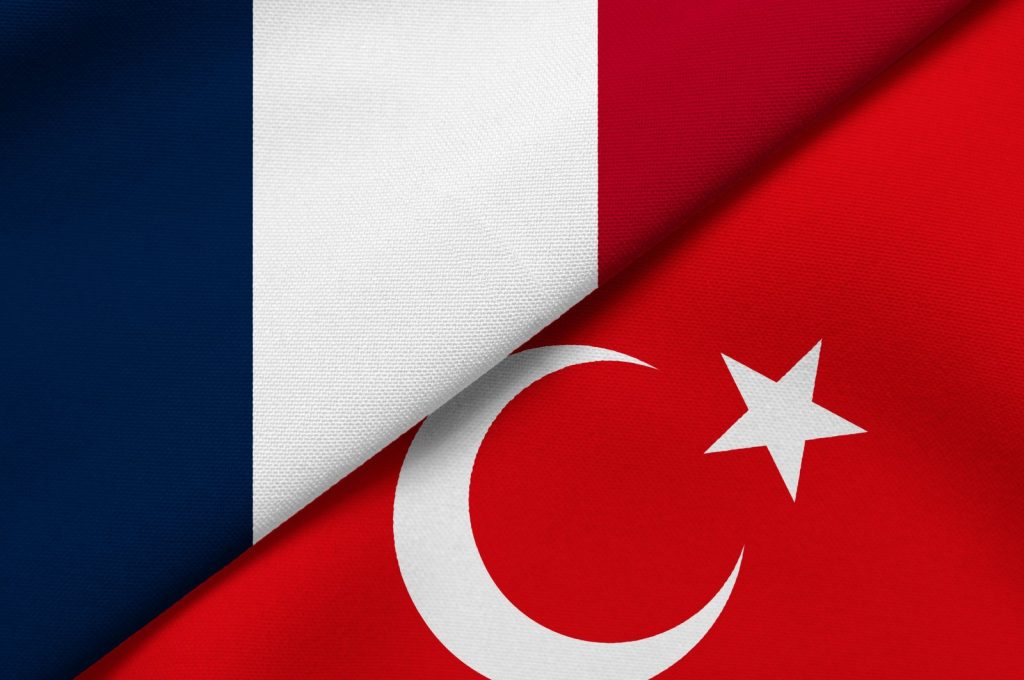Relations between Ankara and Paris have had significant ups and downs in the past decade, originating from different views on issues such as Libya, the Mediterranean, Africa and Syria. Yet, despite the tumultuous political and diplomatic relations, economic ties continued to grow, indicating a stable and high-potential foundation for further growth.
Türkiye and France do not always see eye to eye when it comes to major international issues. While both support ending the war in Gaza as well as a two-state solution for Palestine, views differ on the nature of Hamas. In Syria, Türkiye has long criticized France’s close relations with the PKK terrorist group’s Syrian wing, the YPG. Libya had also emerged as a field of contention when Ankara supported the U.N.-backed government in Tripoli and Paris the putschist Gen. Khalifa Haftar. In the Eastern Mediterranean, France has continuously pursued a pro-Greece and Greek Cyprus stance, disregarding Türkiye’s own rights, while Africa has emerged as a new field of competition for political as well as economic influence.
However, recent years have also seen rapprochement, especially between the leaders President Recep Tayyip Erdoğan and French President Emmanuel Macron. The war in Ukraine and Türkiye’s stance on mediation, as well as the implementation of the Montreux Convention, were hailed by Paris, which also advocated for dialogue with Russia to overcome the crisis. France, which advocates that the European Union should engage in strategic autonomy, more independent from the U.S., is aware of the importance of allying with Türkiye amid increasing geopolitical crises in the region. With the possibility of Donald Trump being reelected as U.S. president in this year’s elections, Macron’s views have gained popularity. Türkiye ratifying the membership bids of Sweden and Finland into NATO was another point that was welcomed by France.
In defiance of the turmoil in political ties is trade growth. The targeted trade volume of 20 billion euros ($21.4 billion) was surpassed last year already as the volume reached 24 billion euros. “This reflects the dynamism of trade relations,” a French diplomatic official said. Companies such as Axa, Renault, Total or BNP Paribas have significant investments in Türkiye, as well as the French Development Agency (AFD). France, which has ranked first as the most attractive country for investment four years in a row, also offers high potential for Turkish investors. The official said that the FDI does not reflect the real potential between the two countries and that the trade volume, which is in France’s favor, could also be enhanced to reach an equilibrium.
Moreover, the Türkiye-France Joint Economic and Trade Committee has not convened for two years and should meet as soon as possible.
The official said that France is open to hosting and organizing or coming to Ankara for the Jetco. “Here, we can discuss and solve also trade irritants that affect trade volume.”
France plans to invest 2 billion euros in Türkiye in the next few years, he underlined, saying that the content is currently confidential but that included several projects including in the field of renewable energy.
Türkiye has made great progress, especially since adopting the Paris Climate Agreement, investing heavily in renewable energy and efforts to curb CO2 emissions. Within this scope, it also started cooperation with several countries on joint projects. Ankara is also adapting itself to the Carbon Border Adjustment Mechanism that the EU has adopted, which will bring tariffs on imports with trading countries.
Vital for low-carbon economies, Türkiye has also engaged in building nuclear power plants in the country. The Akkuyu Nuclear Power Plant was built by Russia’s state atomic energy company Rosatom in Mersin province on the southern Mediterranean coastline. Türkiye has also started planning a second plant in Sinop province at the Black Sea and a third in Thrace.
“France is open to building nuclear plants in Türkiye. It has experience having built projects in countries such as South Africa or Finland,” the official said, adding that demand is also high in the Middle East.
Trust growing
A French businessperson, who has a huge investment in Türkiye, pointed out that the Turkish market is perceived well in France and is often used for regional outreach. The strong skills of the labor market are another reason why Türkiye is preferred.
“Türkiye is a key country in supply chains amid conflicts and business is good right now,” the businessperson said.
On the high inflation and weakness of the lira amid the economic challenges Türkiye faces, he said that high inflation initially caused questions and investment was put on hold. But significant progress is seen and good signals are given to the market by the finance ministry as well as the central bank, he added.
“We trust Mehmet Şimşek and we know he has the backing of the president.”
All in all, the Turkish and French leadership should further promote the growth of economic ties between the two countries although differences of views exist and will continue to exist on regional issues. New sectors such as technology, renewable energy and sustainable cities provide more opportunities to boost the trade volume. Additionally, convening the Jetco and similar mechanisms, as well as French support for updating the EU customs union with Türkiye, would also contribute to flourishing relations.


